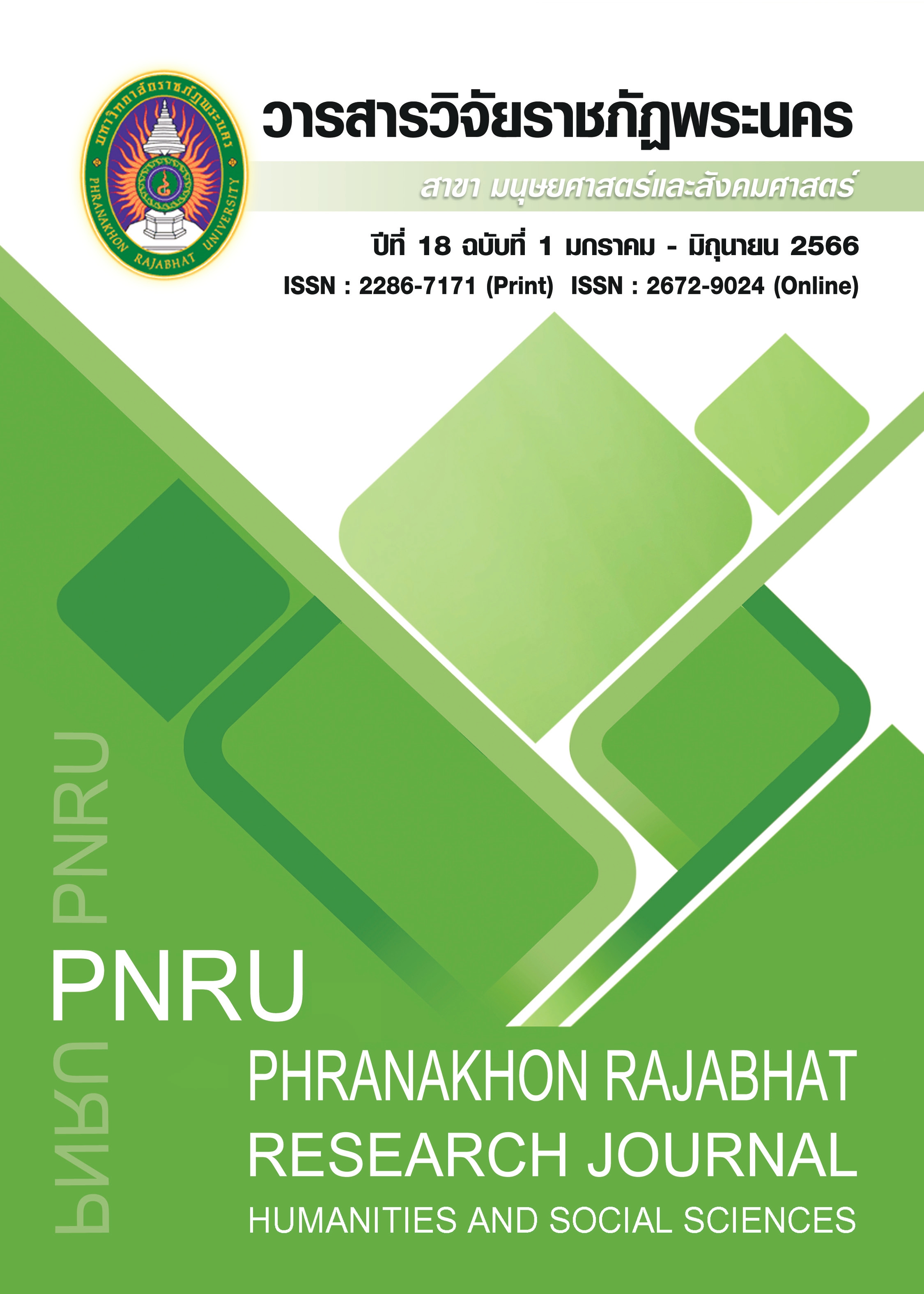GUIDELINES ON AUTHENTIC ASSESSMENT PROMOTION FOR ENGLISH LANGUAGE TEACHERS IN SCHOOLS UNDER NAKHONNAYOK PRIMARY EDUCATIONAL SERVICE AREA OFFICE
Main Article Content
Abstract
This research aimed to: 1) study the condition, problems, and need for training in authentic assessment of English language teachers under the Nakhonnayok Primary Educational Service Area Office, and 2) develop guidelines on authentic assessment promotion. This study consisted of two phases. The first phase was to investigate the condition, problems, and need for training in authentic assessment. The population was 145 teachers and five key informants. The research instruments were a questionnaire and a semi-structured interview form. The data were analyzed using descriptive statistics, namely frequency, percentage, mean, and standard deviation. Also, content analysis was performed. The second phase was to propose guidelines on authentic assessment promotion for English language teachers in these schools, which had been validated by six experts in English language teaching. The findings revealed the following: 1) The teachers used at least one type of authentic assessment. The most frequently used one was worksheet assignment, followed by observation. The least frequently used ones were project work, exhibition, and presentation. Moreover, the teacher’s attitudes, knowledge, and implementation were at high levels. The problems with the implementation of authentic assessment arose from students, students’ families, classroom contexts, budgeting, and teachers. The teachers expressed their need for training in other topics more than theirs in authentic assessment. They would prefer a blended learning model. 2) The guidelines for authentic assessment promotion proposed by the researchers covered four aspects: (1) teachers; (2) a training model; (3) school administrators’ support; and (4) policies of the Ministry of Education.
Article Details

This work is licensed under a Creative Commons Attribution-NonCommercial-NoDerivatives 4.0 International License.
Each publish articles were copyright by Phranakorn Rajabhat University
Any contents which appeared in each articles in the journal were authors personal opinion. It did not relate to Phranakorn Rajabhat University and other instructors in the university. Each authors would take responsibility on their articles. If there are any mistake, the authors will take responsibility themselves
References
Balsong, S. (1999). A study of current situation and problems on portfolio assessment of Phrathomsuksa II teachers under the Office District Elementary Education, Prakhonchai district, Buriram province (Unpublished master’s thesis). Khon Kaen University. Khon Kaen. (In Thai)
Best, J. W. (1997). Research in education. Englewood Cliffs. New Jersey: Prentice-Hall.
Chanta, P. (2020). The guidelines for academic administration of the school administrators in Nakhon Nayok Primary Educational Service Area Office (Unpublished master’s thesis). Rajamangala University of Technology Thanyaburi, Pathum Thani. (In Thai)
Hart, D. (1994). Authentic assessment: A handbook for educators. New York: Addison-Wesley.
Ivancevich, J, M. (2010). Human resource management. New York: McGraw-Hill.
Jeenawathana, A. (2016). Self-development of professional teachers. Veridian E-Journal, 9(2), 1379-1395. (In Thai)
Joy-Matthews, J., Megginson, D., & Surtees, M. (2004). Human resource development. Norfolk: Biddles.
Kotnon, P. (2008). Status and problems of authentic assessment of teachers in primary schools under the Office of Sa-kaeo Education Service Area (unpublished master’s thesis). Burapha University, Chonburi. (In Thai)
Luongo-Orlando, K. (2003). Authentic assessment: Designing performance-based tasks. Ontario: Pembroke.
Mattos, M. (2008). Walk the ’Lign: Aligning school practices with essential PLC characteristics. In R. DuFour (Ed.), The collaborative administrator: Working together as professional learning community (pp.13-36). Bloomington, I.N.: Solution Tree.
Munkham, S., & Sunthonpraseot, S. (2007). Academic work development for academic standing promotion. Bangkok. E.K.Books. (In Thai)
National Education Act, B.E. 2542 (1999). (1999, August 19). Royal Thai Government Gazette. (Vol. 116 No. 74a, pp. 1-23. Retrieved from https://ratchakitcha.soc.go.th/documents/1708862.pdf [2021, 25 May.]
O’Malley, M., & Pierce, L. V. (1996). Authentic assessment for English language learners: Practical approaches for teachers. N.P.: Longman.
Office of the Basic Education Commission. (2007). Approach to decentralization of educational management to the committees of educational service area offices and schools according to ministerial rules, regulations, and procedures of decentralization education management, 2007. Bangkok: The Federation of Agricultural Cooperatives of Thailand. (In Thai)
Phuvipadawat, S. (2001). Teaching principles for learner development and authentic assessment. Bangkok: Duangkamol. (In Thai)
Simahasan, E. & Yutanan, S. (2003). Designing authentic assessment tools. Bangkok: Book Point. (In Thai)
Thanasomboon, S. (2009). Educational quality development of small schools under the Office of Khon Khen Educational Service Area. (Unpublished independent study) Khon Kean university, Khon Kean. (In Thai)
Wiener, R. B. & Cohen, J. H. (1997). Literacy portfolios. New Jersey: Prentice-Hall.


